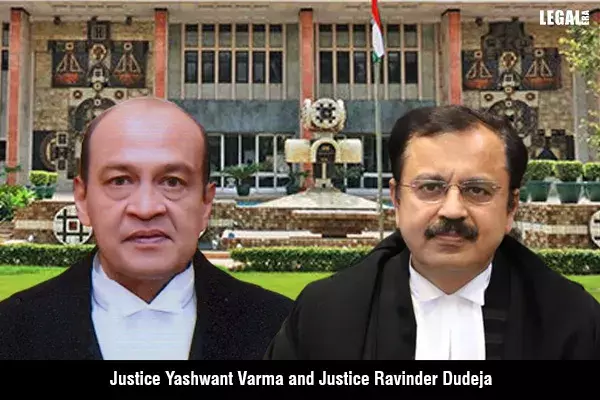Delhi High Court: Article 227 Can Be Invoked To Intervene In Commercial Court Orders Affected By Erroneous Legal Interpretation
The Delhi High Court invoked Article 227 to set aside a commercial court order, ruling that a District Judge's interpretation of Section 42 of the Arbitration and Conciliation Act was flawed.;

Delhi High Court: Article 227 Can Be Invoked to Intervene in Commercial Court Orders Affected by Erroneous Legal Interpretation
The Delhi High Court bench, comprising Justices Yashwant Varma and Ravinder Dudeja, recently addressed a writ petition filed under Article 227, observing that the District Judge's interpretation of Section 42 of the Arbitration and Conciliation Act (A&C Act) was fundamentally flawed. The Court exercised its supervisory jurisdiction to set aside the impugned order, noting that the District Judge's interpretation could inflict irreparable harm on the petitioner.
In the case at hand, a Section 34 petition was submitted by the writ petitioner to the District Judge, who deemed the petition not maintainable in the concerned commercial court. The District Judge interpreted Section 42 as necessitating that the Section 34 petition be filed before the High Court, citing a prior Section 11(6) petition filed there. The reasoning was that the Section 11 petition constituted a prior application made to a court, thus conferring jurisdiction on that court for the setting aside of the award.
Initially, the Court raised concerns regarding the maintainability of the writ petition under Article 227, particularly given the remedies available under Section 37 of the A&C Act. The Court was urged to consider the District Judge's impugned order as one refusing to set aside an arbitral award, which would be covered under Section 31(1)(c).
The amicus curiae submitted relevant findings from the Supreme Court's ruling in BGS SGS Soma JV v. NHPC Limited (2020), which asserted that orders refusing to set aside under Section 34 fall within the purview of Section 37(1)(c). This case specifically addressed whether the Special Commercial Court in Gurugram had jurisdiction when it returned a Section 34 petition. The Supreme Court determined that such a return would not be included in Section 37(1)(c).
Given the absence of a remedy under Section 37 in conjunction with Section 13 of the Commercial Courts Act, the petitioner was justified in invoking the Court's supervisory jurisdiction under Article 227. The Court's jurisdiction extends to exercising judicial review, nabling it to supervise the validity of orders from district courts, as established in Black Diamond Trackparts Pvt. Ltd. & Ors. v. Black Diamond Motors Pvt. Ltd. (2021). This case laid down guidelines for the High Court's power under Article 227 to correct orders made by commercial courts.
The High Court noted that the District Judge's reliance on the Section 11 petition filed in the High Court was relevant to the application of Section 42; thus, the petition to set aside the award should have been filed in the High Court. The impugned order was found not to constitute a refusal to set aside an award based on the grounds set forth in Section 34(2) of the A&C Act. The submissions from the amicus curiae, along with precedents set by the Bombay High Court in Pravinchandra v. Hemant Kumar (2023), supported the maintainability of the Article 227 petition regarding orders from District Judge-level commercial courts. The High Court's jurisdiction remains unaffected by Section 8 of the Commercial Courts Act. The Court clarified that the power under Article 227 is not intended to rectify every error made by subordinate courts but is meant to intervene in cases of significant injustice. The Supreme Court's ruling in Estralla Rubber v. Dass Estate [Pvt.] Ltd. (2001) emphasized that this power should be exercised only in instances of serious dereliction of duty and clear violations of legal principles.
The Court further clarified that the issue of whether a Section 11 petition falls within the ambit of Section 42 is well established. The Supreme Court in State of West Bengal v. Associated Contractors (2015) determined that a Section 11 application is not presented before a "court" but rather before the Chief Justice of the High Court or Supreme Court. This ruling is significant because it indicates that the Chief Justice or their delegate makes decisions in a judicial capacity, but Section 42 does not apply to applications made before them, as they do not qualify as "court" as defined in Section 2(1)(e) of the A&C Act. Therefore, since a Section 11 application is not made to a court as defined, it does not fall under Section 42. The District Judge's decision to return the petition to the High Court, based on an erroneous interpretation of Section 42, was deemed incorrect. If unaddressed, this mistake would result in significant injustice, necessitating the clarification of the correct legal position arising from Section 42.
In conclusion, the Court allowed the writ petition and set aside the impugned order issued by the District Judge.

